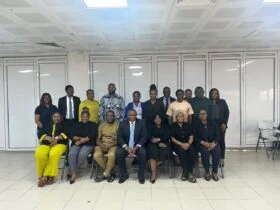Business Recovery and Insolvency Practitioners Association of Nigeria (BRIPAN) has empowered the Nigerian Deposit Insurance Corporation (NDIC) with personal insolvency, liquidation practices and corporate restructuring skills.
The President, BRIPAN, Mr Chimezie Ihekweazu, said this at an event on Friday in Lagos.
Ihekweazu said the training would strengthen their capacity to handle debt recovery and business restructuring matters.
Ihekweazu, a Senior Advocate of Nigeria, stated that the NDIC would be equipped with business recovery skills on winding up process, assets realisation and distribution, voluntary winding up receivership, scheme of arrangements and compromise.
He said other areas of training includes receivership, secured creditors, securities and insolvency, company voluntary arrangement process, cross border insolvency among others.
He said the development would deepen understanding of personal insolvency as an effective legal tool for debt management and equitable treatment of creditors under Nigerian law.
Ihekweazu explained that personal insolvency, also known as bankruptcy, applies to individuals or firms unable to meet their debt obligations, but had been underutilized despite its clear provisions in Nigerian law.
“It is technical and calls for strict application; however, it remains a viable process for debt recovery and management for valid claims against individuals and firms.
“It must be admitted that though personal insolvency is provided under our Law, it has enjoyed little application under our judicial system.
“Thus, while the law remains potent, most practitioners have continued to shy away from it and this attitude is wrong and should be discouraged,” he said.
Speaking on liquidation, Mrs Chinwe Chiwete, Principal at Epic Legal, explained the process involved in winding up of a limited liability company or association under the Companies and Allied Matters Act (CAMA 2020).
Chiwete said in situations where the liquidation involves assets located in other jurisdictions across border and other cross border insolvency claims, the necessary laws applicable in those jurisdictions would apply.
These laws, Chiwete noted, include their local insolvency legislations and where applicable the United Nations Model Law on Cross Boarder Insolvency (UNCITRAL MODEL LAW).
She stated that while most countries in Europe and America have taken steps to adopt the UNCITRAL Model Law, Nigeria was yet to adopt or domesticate this law.
She urged BRIPAN to take the initiative and work with all stakeholders including the Ministry of Justice, of Industry, Trade and Investment, the National Assembly and other Institutions to ensure that progress is made in this area of insolvency.
“While it is possible that assets of a company in liquidation may not be adequate to satisfy all claims against the company in liquidation, proper approach, compliance with the relevant laws and standard practice will guarantee satisfaction among all persons entitled to benefit and as may be affected by the process,” she said.
Partner, PUNUKA Attorneys and Solicitors, Mr Okorie Kalu, described corporate restructuring as a legal and operational process undertaken to modify and re-organise a company’s financial and operational structure, especially during business distress.
Kalu said the Nigeria Deposit Insurance Act regulates the operations of insured financial institutions and empowers the Corporation to act as a liquidator of any failed insured institution whose licence had been revoked, in line with Section 40 of the NDIC Act.
According to him, the Act also mandates the corporation to take certain steps before liquidation is activated, while Section 37 positions it as a pseudo-administrator responsible for assisting failing institutions.
“Section 38 of the NDIC Act allows the Corporation to take over the management of a failing bank,” he said.
Kalu noted that under its enabling law, the NDIC could explore several options in rescuing distressed insured institutions.
These include directing management changes, arranging mergers or acquisitions with other insured institutions, and acquiring, managing, or disposing of impaired assets directly or through a management company, as provided in Section 38(1) of the Act.
He added that under the Companies and Allied Matters Act (CAMA), the NDIC could also employ administration as a tool during liquidation on public interest grounds, or act as a creditor to take control of businesses with potential for improved management.
“The paradigm of rescue is critical under Section 39 of the NDIC Act and Section 444 of CAMA,” he said.
Kalu explained that although administration might appear to be a new insolvency tool in Nigeria, the country’s existing laws had long provided mechanisms for financial regulators, including the NDIC, to achieve business rescue or reorganisation similar to the role of an administrator.
He stressed that since NDIC’s liquidation function focused on asset realisation and recovery from ongoing concerns, a good understanding of the opportunities offered by general law was vital to enhance its recovery toolkit.



